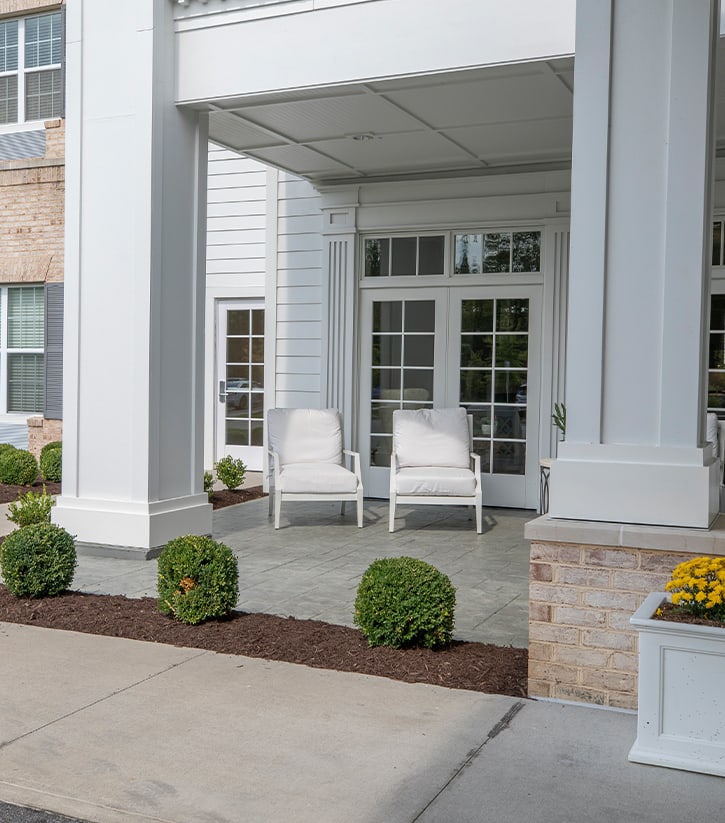Watching a parent struggle with dementia can feel overwhelming. The person who once provided guidance and support now needs your help navigating daily life.
You can help by improving communication, creating a safe and supportive home environment, and understanding your loved one’s healthcare options.
Memory care communities can also offer support for you and your family, easing the burden of caregiving and allowing you to focus on spending quality time with your loved one.
Understanding Dementia: The Foundation of Better Care
Dementia is an umbrella term for a group of symptoms that severely affect memory, thinking, and social abilities, interfering with daily functioning.
Alzheimer’s disease accounts for 60–80% of dementia cases, but other forms include vascular dementia, Lewy body dementia, and frontotemporal dementia.
Unlike normal aging, dementia involves progressive changes in the brain that worsen over time. Early signs may include:
- Difficulty remembering recent events or conversations
- Challenges with problem-solving and planning
- Confusion about time, place, or familiar people
- Changes in mood, personality, or behavior
- Trouble with language & communication
Understanding your parents’ specific type of dementia helps you anticipate changes and adapt your care approach accordingly. Each person experiences dementia differently, so staying flexible and patient becomes crucial.
Communicating with a Parent with Dementia
Effective communication forms the cornerstone of caring for someone with dementia. As the condition progresses, your parent may struggle to find words, follow conversations, or express their needs clearly.
Adapt Your Communication Style
Speak slowly and clearly, using simple sentences and familiar words. Maintain eye contact and use a calm, reassuring tone. Give your parent time to process information and respond—rushing conversations often increases confusion and frustration.
Instead of asking open-ended questions like “What would you like to do today?” try offering specific choices: “Would you like to listen to music or look at photo albums?” A more focused approach helps reduce decision fatigue while maintaining your parents’ sense of autonomy.
Validate Their Emotions
Rather than correcting misunderstandings or arguing about facts, focus on acknowledging your parents’ feelings. If they’re worried about a deceased relative, saying “You really miss them” validates their emotion without reinforcing confusion.
Create Familiar Routines
Consistent daily routines provide structure and reduce anxiety. Establish regular times for meals, activities, and rest. When possible, involve your parent in familiar activities they can still enjoy, such as folding laundry, watering plants, or listening to favorite music.
Creating a Dementia-Friendly Home Environment
A safe and comfortable home environment can significantly improve your parents’ quality of life and reduce behavioral symptoms. Minor modifications can make a big difference in their daily functioning.
Prioritize Safety
Secure sharp objects, toxic substances, and loose rugs. Install grab bars, improve lighting, and use door alarms or locks to prevent wandering. Confirm that smoke and carbon monoxide detectors are working, and consider installing automatic shut-offs for appliances.
Optimize Lighting & Noise
Use natural light during the day and nightlights for evening. Minimize background noise from TVs, radios, or appliances to avoid overstimulation.
Design for Independence
Arrange furniture to create clear pathways and keep essential items within easy reach. Use tools like large-button phones, easy-grip utensils, or velcro clothing to encourage independence.
Navigating the Healthcare System
Managing medical care for a parent with dementia requires coordination, advocacy, and careful planning. The healthcare system can feel complex and overwhelming, but taking organized steps can help your parent receive appropriate care.
Build a Healthcare Team
Find a primary care doctor experienced in dementia care to coordinate with specialists, such as neurologists or geriatricians. Consider geriatric care managers for help with services and insurance.
Prepare for Appointments
Bring a list of medications, note changes in behavior or symptoms, and prepare questions in advance. Bring a family member or a reliable friend to help track details.
Plan Legally & Financially
While your parent can participate, discuss advance directives, power of attorney, and healthcare proxies. Consult a senior law attorney for asset protection and long-term care planning.
Manage Medications
Simplify routines with pill organizers or reminder apps and review prescriptions regularly with healthcare providers to avoid issues.
The Importance of Self-Care for Caregivers
Caring for a parent with dementia can be physically and emotionally exhausting. Caregiver burnout is common. It can negatively impact both your health and your ability to provide quality care.
Recognize Caregiver Stress
Look out for fatigue, irritability, social withdrawal, appetite or sleep changes, frequent illness, depression, and anxiety, which are common among dementia caregivers.
Take Breaks
Use respite care services like adult day programs, in-home care, or short-term residential care to rest and recharge. Taking these breaks is essential for you and your loved one.
Prioritize Your Health
Keep up with check-ups, eat a balanced diet, exercise regularly, get enough quality sleep, and consider therapy to manage stress effectively.
Set Realistic Goals
You can’t stop dementia’s progression. But you can focus on providing comfort and meaning in the here and now. When you set realistic goals, you and your parent can find fulfillment and strengthen your relationship.
How Memory Care Supports Families

As dementia progresses, families often need additional support beyond what they can provide at home. Memory care communities offer specialized services designed specifically for people with dementia and their families.
Specialized Programming
Memory care communities provide structured activities designed to engage residents at their current cognitive level. These programs often include music therapy, art activities, gentle exercise, and reminiscence therapy.
Staff members receive specialized training in dementia care techniques, enabling them to provide the appropriate level of support with compassion and understanding.
24/7 Professional Support
Professional caregivers can manage complex care needs, administer medication, and address behavioural challenges. The staff provide around-the-clock support that supports safety while maintaining dignity and quality of life.
Transitional Support
Memory care communities can help families navigate the difficult transition from home care to residential care. Social workers and care coordinators work with families to maintain continuity of care and offer emotional support during this adjustment period.
Moving Forward with Confidence & Compassion
Woodland Hills understands that supporting a parent with dementia requires patience, flexibility, and enormous love. While the journey presents significant challenges, focusing on creating positive moments and maintaining your parents’ dignity can bring meaning to difficult days.
Contact us today to learn how our community can help support you and your family through personalized care, therapeutic programs, and a secure, uplifting environment.














